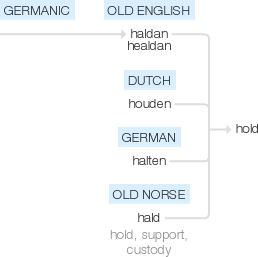Hold
Old English haldan, healdan, of Germanic origin; related to Dutch houden and German halten ; the noun is partly from Old Norse hald ‘hold, support, custody’.
wiktionary
From Middle English holden, from Old English healdan, from Proto-Germanic *haldaną(“to tend, herd”), maybe from Proto-Indo-European *kel-(“to drive”) (compare Latin celer(“quick”), Tocharian B kälts(“to goad, drive”), Ancient Greek κέλλω(kéllō, “to drive”), Sanskrit कलयति(kaláyati, “he impels”)). [1] [2] Cognate to West Frisian hâlde, Low German holden, holen, Dutch houden, German halten, Danish and Norwegian Bokmål holde, Norwegian Nynorsk halda.
Alteration (due to hold) of hole. Cognate with Dutch hol(“hole, cave, den, cavity, cargo hold”), Dutch holte(“cavity, hollow, den”).
From Middle English hold, holde, from Old English hold(“gracious, friendly, kind, favorable, true, faithful, loyal, devout, acceptable, pleasant”), from Proto-Germanic *hulþaz(“favourable, gracious, loyal”), from Proto-Indo-European *kel-(“to tend, incline, bend, tip”). Cognate with German hold(“gracious, friendly, sympathetic, grateful”), Danish and Swedish huld(“fair, kindly, gracious”), Icelandic hollur(“faithful, dedicated, loyal”), German Huld(“grace, favour”).
etymonline
hold (v.)
Middle English holden, earlier halden, from Old English haldan (Anglian), healdan (West Saxon), "to contain; to grasp; to retain (liquid, etc.); to observe, fulfill (a custom, etc.); to have as one's own; to have in mind (of opinions, etc.); to possess, control, rule; to detain, lock up; to foster, cherish, keep watch over; to continue in existence or action; to keep back from action," class VII strong verb (past tense heold, past participle healden), from Proto-Germanic *haldanan (source also of Old Saxon haldan, Old Frisian halda, Old Norse halda, Dutch houden, German halten "to hold," Gothic haldan "to tend").
Based on the Gothic sense (also present as a secondary sense in Old English), the verb is presumed originally in Germanic to have meant "to keep, tend, watch over" (as grazing cattle), later "to have." Ancestral sense is preserved in behold. The original past participle holden was replaced by held beginning 16c., but survives in some legal jargon and in beholden.
The modern use in the sense "lock up, keep in custody" is from 1903. Hold back in the figurative senses is from 1530s (transitive); 1570s (intransitive). To hold off is early 15c. (transitive), c. 1600 (intransitive). Hold on is early 13c. as "to maintain one's course," 1830 as "to keep one's grip on something," 1846 as an order to wait or stop.
To hold (one's) tongue "be silent" is from c. 1300. To hold (one's) own is from early 14c. To hold (someone's) hand in the figurative sense of "give moral support" is from 1935. To hold (one's) horses "be patient" is from 1842, American English; the notion is of keeping a tight grip on the reins. To have and to hold have been paired alliteratively at least since c. 1200, originally of marriage but also of real estate. To hold water in the figurative sense "be sound or consistent throughout" is from 1620s.
hold (n.1)
c. 1100, "act of holding;" c. 1200, "grasp, grip," from Old English geheald (Anglian gehald) "keeping, custody, guard; watch, protector, guardian," from hold (v.). Meaning "place of refuge" is from c. 1200; that of "fortified place" is from c. 1300; that of "place of imprisonment" is from late 14c. Wrestling sense is from 1713. Telephoning sense is from 1961 (on hold), from expression hold the line, warning that one is away from the receiver (1912). Meaning "a delay, a pause" is from 1961 in the U.S. space program. No holds barred "with all restrictions removed" is from 1892, originally in wrestling.
hold (n.2)
"space in a ship below the lower deck, in which cargo is stowed," 15c. corruption of Middle English holl "hull of a ship, hold of a ship" (c.1400), which is probably from earlier Middle English nouns meaning either "hole, hollow place, compartment" (see hole (n.)) and "husk, pod, shell," (see hull (n.1)). With form altered in the direction of hold (probably by popular apprehension that it is named because it "holds" the cargo) and sense influenced by Middle Dutch hol "hold of a ship."
